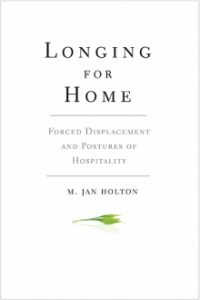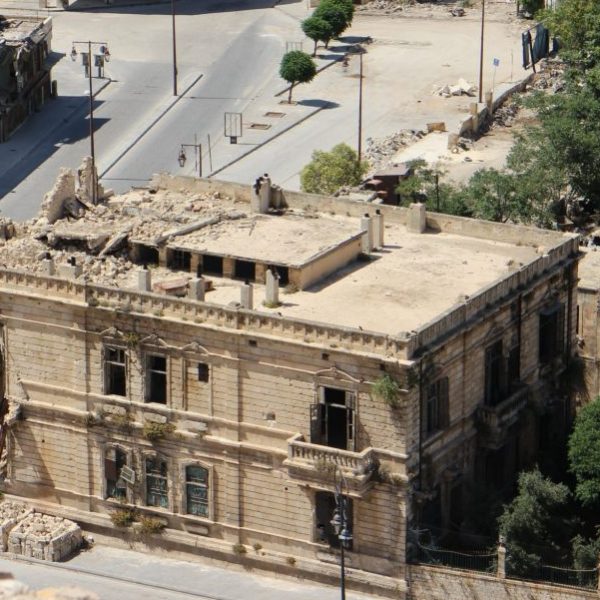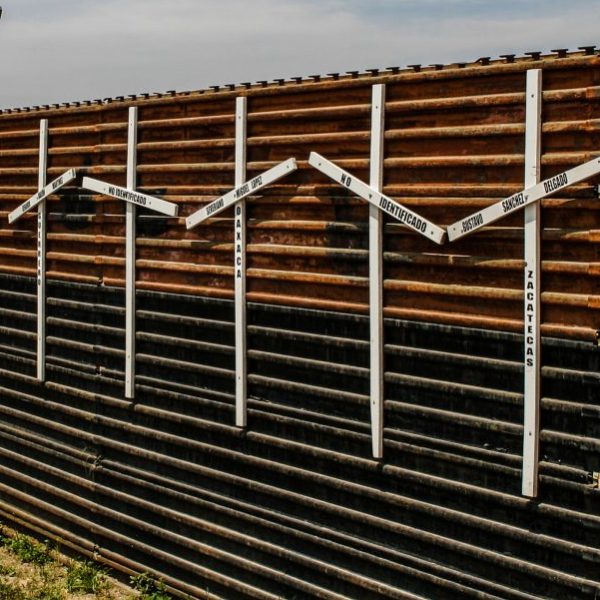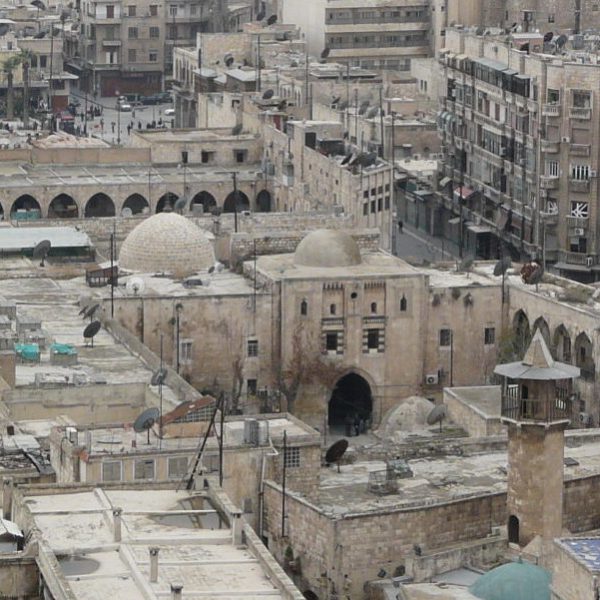Resisting the Narrative of Fear against Refugees
M. Jan Holton—
Fear is a daily course in the life of refugees fleeing from war. Consider for example the citizens of Aleppo facing bombings, torture, starvation, and death. The title of a New York Times article about the final days before the fall of Aleppo says it all “We are dead either way”. For most of us it would take a rather extraordinary circumstance to make us suddenly walk away from all that we have and everything familiar to us. And so it is for refugees around the world, approximately 5 million from Syria alone, whose journeys are almost always long, dangerous, and filled with uncertainty.
The tragic events of 9/11 made us startlingly aware of our vulnerability as a nation and as individuals. It left a mark on us and we have yet to recover. That September morning ushered in a new age of fear for citizens across the United States—and Europe. We have named that fear terrorism and given it the face of our Muslim neighbors. That fear has become our absolute enemy.
When I meet refugees fresh off the plane arriving to resettle in the United States I am struck by the overwhelming mixture of emotion I see in their eyes. I often see fear there but equal parts excitement as well. Families want to feel relieved but do not know who is meeting them or where they are going to live. They worry about loved ones left behind. Some families, unsure what the future will hold, bring dishes, cooking pots, and even food packed in suitcases. They do not know that agencies in states like Connecticut have stocked adequate food in the refrigerator and furnished an apartment in preparation for their arrival.
Contrary to some claims, refugees arriving in the United States for resettlement are not foreigners about whom we know nothing. Each refugee undergoes a series of rigorous background checks conducted by the Department of State and lasting eighteen to twenty-four months. They check the watch list and work with U.S. law enforcement, the intelligence agencies, the National Counterterrorism Center, Refugee Affairs (a special screening for Syrian refugees), the Fraud Detection Agency. They conduct personal interviews by trained personnel. They also run fingerprints through the Federal Bureau of Investigation (FBI), Department of Homeland Security (DHS), and Department of Defense (DOD), and the Transportation Security Administration (TSA). (See this helpful graphic) Newly resettled Syrian refugees in Connecticut, for example, give first-hand accounts of the long interviews and add that they were often repeated over several months time.
In spite of these many screenings, popular political rhetoric would have us believe that refugees, specifically Muslim refugees from Syria and elsewhere in the Middle East, are a particular threat to our national security.
It is no great surprise that fear, which makes us feel vulnerable, is also a source of great power for those who wield it. One who tortures almost exclusively counts on fear instilled by repeated violence, humiliation, pain, and suffering to gain control over a victim. Despots and demagogues, rebels and armies, and mediocre politicians all know that fear yields power– they count on it.
Political sociologist Didier Bigo and others propose the term “management of unease” to describe the crafting of political power from a narrative constructed around national insecurity and fear. Politicians, he suggests, use fear—usually focused on the foreigner, especially the refugee or migrant—to gain power that has been lost elsewhere. Make no mistake the management of unease does not strive to mitigate fear. Rather, it is the managing or manipulating of fear and unease to the benefit of the one who seeks power. It stokes fear in order to further a political agenda.
Fear of annihilation, death in whatever form we may meet with it, has always been an integral part of human suffering. Religion—theologians and philosophers in tow—have long struggled with questions about human suffering and its underlying fear. The very fact that we humans will die and know that we will die can cause us to behave in very unhelpful ways. For the most part, though, we keep these fears and anxieties below the surface of consciousness so that we can go about our daily lives. Terrorism brings the reality of death front and center. Its arbitrary nature heightens underlying anxieties making us easy prey to politicians and others waiting to convince us that we need their protection. The Courage to Be by theologian Paul Tillich is a helpful resource for Christians asking questions about our finitude and the ensuing anxiety that undergirds all that we do. Tillich calls for a type of courage only found when we root ourselves in the spiritual ground of being from which we come. Many of us would name that to be God. It is both strikingly more complex than this statement and yet utterly this simple.
Refugees do not always find welcoming kindness when they reach the lands of abundance and safety in the United States, Europe, and Australia. Political narratives of insecurity are increasing and newly arrived refugees-suitcases in tow-are increasingly at risk in their land of refuge. Citizens are left with choices of how to respond to these narratives—when to be cautious and when to exhibit a moral courage to advocate for refugees at home and around the globe who need our help now more than ever.
M. Jan Holton served on the faculty at Yale Divinity School in the area of pastoral theology, care, and counseling. She is the author of Building the Resilient Community: Lessons from the Lost Boys of Sudan, a study that focuses on field research in South Sudan.
Further reading:




























I disagree, thoroughly.
The article, obviously, does call for a reply from a practitioner in the field. I am a long-time practitioner. Introductory note: I am glad to refreshen my Yale affiliation after a long time; I was a Yale History Assistant in Instruction and hold a Yale M.Phil. degree – Yale Course Critique rated my sections as „amusing and informative“ -, and I do hope the ensuing reality report will come up to those Yale-certified qualities.
Since 2014, I have been, and still am, what here in Germany is called a Voluntary „Flüchtlingshelfer“.
I prefer, and that´s the gist of my objection, the term „migrant helper“.
What we are talking about here, for all practical purposes, in the US, in Europe, and elsewhere, is migrants, not refugees. Migrants may claim the refugee status, within a framework of democratic legality, and that claim must be backed by documentary evidence.
Migrants are refugees under the condition of being recognized as refugees.
My two points of disagreement with the article: First, I disagree with what I perceive as the generalizing, romanticized, blatantly reality-ignoring „welcome“ approach to migrants. I call it „welcomism“. Second, on an epistemelogical level – as a historian, empirist and naturalist -, I do not acknowledge any so-called „theological“ way of arguing. „Theology“ is non-scholarship. „Theologians“ claim to know their object of research a priori of research. That´s not on.
There is much attention to Syria, today. There are, if you please, other countries involved. „My“ countries: Albania, Georgia, Kosovo, Montenegro, Pakistan, Serbia, Syria, Ukraine. My tasks: innumerous car transports (not repaid), shopping assistance, negotiations with agencies, offices, hospitals, doctors (I learned a lot about intricacies of the medical profession), schools (Syrian boy, 12, to high school, no bureaucratic problem – I know the director, film club fellow; boy´s older brother refused school, said left S. wanting evade draft – I keep wondering); bus time-table exercises („Ortsmitte!“ „Familienkarte!“); kindergartens (learned a lot about pre-school system); language learning (both Pak. parents: mark A1); 4 used bikes collected, partly repaired; tv set installed (help film club fellow); German driver licence (about 6 offices involved – herculian work); apartment seeking, talks to house-owners; job seeking, talks to employers – all co-operative.
Top achievement: getting Pak. family father in permanent job position with local constructor!
Anyways, I have, in thorougly hands-on practice, developed grave doubts as to the „refugee“ quality of the vast majority of „my“ migrants. Georgia? Serbia? Ukraine? Montenegro? A young Monten. couple showed up at our „Sozial-Amt“, got the welcome pay check, and after 2 days informed us of preferring to go back – guess where? Montenegro. At present, we, my wife and myself, are assisting just the Pakistani family. They are, as they say, harrassed, at home. By whom? Theologists. „The Mullahs“.
Your article features a picture of a demonstration sign: „Refugees are human beings.“ Who doubted? This is flamboyant welcomism at its best. It is silly. It is off the point, and blatantly so. The question is definitely not „human or not human“, but „refugee or no refugee“.
There is, in the public debate, here in Germany, saddeningly sparse reference to the factual groundwork of „refugee“ handling. This is our Constitution – the Grundgesetz, Art. 16a (Asylum in case of personal, and state-run, persecution) -, the Geneva Refugee Convention, and the Asylum Law.
A-sylia, literally, means individual „freedom of robbery“. Robbery of life, that is. By state agencies. The Convention, and the Asylum Law, list 5 criteria of being persecuted by the state. At least one must apply in order to be acknowledged as a refugee, and with that, in most cases, as an Asylum-entitled person.
These are the facts. The welcomist movement is, if at all, only nebulously aware of these legal facts; and, often, whoever dares just mention them is ostracized as PRS: Populist, Racist, Sexist. I am tired of this cheap welcomist rhetoric.
Refugee welcomism is, I would suggest, an outcome of Western culture at its present stage. That culture, for the last 40 or 50 years, has produced our Fun&Wellness societies. The Good Life for all. Laughing – grimacing – faces everywhere. Forced gaiety. Artificial adventure. Fake „events“ galore. Coffee to go, fun to go. And pre-eminent in the New Culture: „Christian“ churches, meeting and breeding places of god-sanctioned Fun&Wellness. Let me feel well, for gods sake! And, in order for me to feel well, other people, around me, must feel well, likewise. Enter „refugee“. Overrun, by wellness-seekers, with fun selfies, flowers, and obligatory grimacing. Let us feel well, all of us. Obligatory grinning. Exhibitionist Fun. (Disliked by some Islam believers – and I can follow them, to some extent.)
The article mentions helpers carrying „dishes and cooking pots“ to supposedly desolate living quarters of „refugees“. This is illustrative. Yes, we, my wife and I – naively entangled in that romantic welcomism which, in Germany, may be explained, in addition to the Fun&Wellness syndrome, with a view to the burdening heritage of modern German history – we rushed to migrant apartments, armed with those „dishes and cooking pots“, with blankets and toys for the children, and expecting haggard and downtrodden „refugees“.
A laughable misconception, as it turned out.
Migrants, as experiened by us, are newcomers looking for the „better life“. Alright. However, this „better“ does not necessarily always relate to one or more of those 5 asylum criteria of personal persecution by their home state which must needs be plausibly proven by applicants for gaining the refugee/asylum status. Period.
It has lately been discovered, here, that numerous „refugees“ lustily traveled from SozialAmt to SozialAmt, in various places, presenting changing identities. What fun! And they got the money and got off with it, and undiscovered so, for a long time. And lo and behold: people who knew about this – you would call it fraud -, did not dare make it public, in fear of the PRS inquisition!
This is the scandalous reality of god´s own welcomism narrative.
We go on helping. Helping is just a neighbourly gesture, irrespective of any „church“ belonging. Religion, faith, and helping, do not need any pastoral blessings. What for? I do not wish hollow church ceremonialism meddling with my life. I claim to be a religious person, and I try to be a believer. Re-ligio, in the original Latin context – rem ligare -, means: taking care, being responsible. This has nothing to do with a fun-providing non-entity named „god“. Nor have belief, or trust, or faith.
Faith, in those texts from Hellenistic Judaea, texts commonly called „New Testament“, is pistis, pisteia – highlighted long before those texts, e.g. by Heraklitus. Pistis is trust – German: „Glauben“. Being „pistos“ is a human, a natural experience. It does not „transcend“ the community of mankind. Trust is not in „spirituality“. Nor in „god“. New-fangled „spirituality“ as well as home-baked „theology“ – Christian, Jewish, Muslim – strive to „transcend“ the community of mankind. At the very heart of that community is the Wish to Live. That´s Schopenhauer, a bit softened; actually he says „Will to Live“. Disregarding this wish, and repressing it, eventually in violent ways, is the fundamental sin. Sin is related to „asunder“: separation, exclusiveness, arrogance, loneliness, despair, violence.
Any „theology“ is downright sin: Christian denigration of women, Jewish „Holy Land“ claims, Islamic decency violence.
There is, in this context, a passage in the article which strikes me as particularly off-the-point. „We have named that fear terrorism and given it the face of our Muslim neighbors. That fear has become our absolute enemy.“
The absolute enemy is our fear? This is distorting factual evidence. There is terrorism, and it is theological terrorism. The theology is called Islam. Cases in point abound. France, Germany, the US. I recommend Graham Wood, What is the Islamic State, The Atlantic Monthly, March´15: „The reality ist that the Islamic State is Islamic. Very islamic.“ I often ponder about that Berlin Xmas murder action, December ´16. What if one of our children or grand-children had been at that fair?
Church religion, whatever its name and its origin and its practices, is an anti-human form of culture. It is sin. Church religion is ceremonialized exclusiveness, including violence. Graham Wood: „The Islamic State is a variety of Islam“.
A specific, highly actual, and highly tangible type of anxiety – the one in face of violent Islam, easily to be identified as such – is mutated, in the article under consideration, from the programmatically evasive vantage point of a wilfully deranged „theology“, into just another form of passing away: it is all human. It is an „integral part of suffering“.
Then what for do we need any screening of incoming „refugees? We are doomed, anyway, all of us. We all, including our dear terrorists, hail from that „spiritual ground“ of benignly equal children of „god“.
Good bye, god. – And back to work. Fasten children´s seats, in the car. Tomorrow: Pakistani kids to special medical check-up. 140 km journey.
Osaid, 5, Amrah, 3, Khaula, 1.
They remind me of our grand-children.